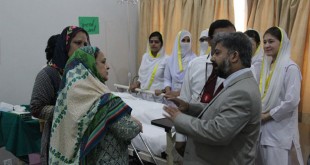Recent developments in Pakistan-Afghanistan relations in the form of flurry of meetings and the reciprocal visits of Pakistani and Afghan leaders during recent weeks are a good omen for an improved relationship between the two countries. It is an undeniable fact that Pakistan and Afghanistan have common interests, shared future and shared destiny owing to uncountable reasons and factors. One thing that lacks is the realization of this fact that both countries are ignoring; hence, they are losing the golden opportunities offered time and again to move forward with common agenda.
Despite the fact that Pakistan and Afghanistan are closely interwoven historically, culturally, religiously and ethnically, the relationship between Pakistan and Afghanistan has incessantly been topsy-turvy during the past seven decades. In the present-day context, where foreign forces have withdrawn from Afghanistan drastically after a misadventure spanning more than a decade and a half, regional players have geared up for enhanced roles. In this scenario, a smooth and mutually-beneficial relationship becomes particularly significant for both Islamabad and Kabul. Global and regional factors have always been at play and, at times, decisive as well. So, will they remain cropping up from time to time? Same is the case with divergences of opinions – at times, interests – at bilateral level. The question before the two brotherly nations today is: how to maintain a desired level of bilateral harmony, in months and years ahead?
There are many sources of affinity between the two nations, i.e. historic, cultural, religious and ethnic. Out of these many roots of affinity, the religious bond and the Islamic teachings are naturally the best possible framework for resolving the bilateral issues. Yet, the intricacies involved in the interstate relations in today’s world also cannot be ignored altogether; they need proper consideration.
Before taking all the important steps, there is an immediate need to rebuild the confidence and trust between the two countries with visible and tangible effects. A process of sincere dialogue with clear goals and objectives; a long-term, all-inclusive approach to address all the issues, respecting each other’s national interests and bringing them on the negotiations table, should be initiated at the earliest. In a show of maturity, the two countries, however, should refrain from airing negativity against each other through media.
Rebuilding the bilateral relationship should be approached with an enhanced focus on positivity and exploring commonalities rather than the oft-beaten path of sticking to the issues, differences and divergences.
It must be understood that external forces would always focus on achieving their vested interests, thus, creating problems for the populace here. But, the point for the leaderships and peoples of the two countries to ponder over is: how to steer clear of pushes and pulls being motivated by the external forces, and move towards a smooth bilateral relationship.
Furthermore, as for the intra-Afghan peace process, it must be understood that only the Afghans themselves are best suited to solve their problems. Intra-Afghan understanding is the key in this regard. Public opinion in Afghanistan is not in support of war; the US-led war has remained meaningless for the Afghans and the presence of foreign forces has remained an enormous obstacle to peace, and a concern for the warring parties as well.
Nevertheless, there are such lobbies that do not favour and support peace. They include the forces of status quo which are benefitting from the prolonged conflict, hardened positions of the parties involved which diverge widely, and now the Daesh factor has also come up with a massive impact. The war economy is strong enough to be looked upon while discussing Afghan peace. Any move toward peace will have to keep these factors in view.
In this regard, the role of regional countries is also important. While Pakistan has its limitations, it is well positioned to play a facilitating role, which it has played and is still playing. This role and position of Pakistan may be targeted constructively – if the Afghans so desire – with an aim to achieve lasting peace in Afghanistan and the region as well. However, it will be of great import that Pakistan’s steps and initiatives should, very clearly, be treating all Afghans as equally important and having equal status.
To avoid any misunderstanding, broad-based intelligence cooperation needs to be developed between the two countries. This will be a step toward building mutual confidence between the all-important security institutions of the two countries. Unfortunately, the issue of ‘strategic depth’ has often been highlighted negatively in the past and the discourse prevails even today. Friendly relations between any two neighbouring countries provide mutual strategic depth. In case of Pakistan, the phrase has, by and large, been used and highlighted as a desire for control over Afghanistan, which has neither been an official policy of any government or institution in Pakistan, nor an aspiration of its people. A balanced discourse is much needed in this regard.
China’s role in the form of economic cooperation and efforts for prompting stability has increased in the affairs of Afghanistan. Afghan opposition is of the view that China, being an upcoming superpower, can take a firm stand against the United States. As Pakistan and China already enjoy excellent relations, and the former’s affinity with Afghanistan is also well established, therefore, this can be a mutually beneficial three-way relationship. China’s role in Afghan peace process and Afghanistan’s development has created goodwill for it and the Afghans see it as a neutral and positive actor in Afghan affairs.
A team of dedicated researchers and experts from Pakistan and Afghanistan should be formed to find ways and means for building an in-depth understanding of the issues facing the two countries from within and outside. Besides, it should also look for the opportunities for a broad-based, deeper cooperation between them and the ways to counter the challenges and obstacles in this regard. It should also suggest strategies for the policymakers and political leaders of the two countries to tackle challenges and to build upon the opportunities.
A list of common interests of the two countries may be developed by institutions and civil society organizations and may be disseminated for the consumption of academia and media as well as faculties and students of institutions of higher learning on both sides of the Durand Line. This will help in developing a balanced discourse about each other, on both sides of the border.
Economic collaboration and people-to-people contacts need to be strengthened and made broad-based. In this regard, immense opportunities exist for promoting mutual collaboration in trade, investment and other joint ventures, especially in the mining sector. Energy sector, particularly hydropower, also presents bright prospects of collaboration. Well-thought-out strategies should be developed on fast track for benefitting from these possible avenues of cooperation and to surmount the legal, infrastructural and trust-related obstacles to this specific area of cooperation too. Similarly, opportunities of cooperation in social sectors such as education and health should also be capitalized on for further closeness and mutual cooperation between the two sides. Water- and drugs-related issues also highlight the need for collaborative strategies. Production and trafficking of drugs, at first, affects our own population and then that of the world in general and it is the foremost duty of the two states to curb the dugs menace.
Last but not least, the issue of refugees and displaced persons should be seen from the lens of a long-standing linkage between the two societies, and an environment conducive to creating a smooth, mutually agreeable, lasting solution, which is respectable for refugees and displaced persons, needs to be created. Tensions in the relations between the two countries should not affect the status of refugees and the displaced people. Peace and economic stability and development are the prerequisites for a sustainable solution to this issue.
To sum up, all these steps can be materialized when there is conviction and commitment in the leaders of the two states and it is accompanied with long-term plan and sincerity to deliver some good for their citizens and the future generations.
 Jahangir's World Times First Comprehensive Magazine for students/teachers of competitive exams and general readers as well.
Jahangir's World Times First Comprehensive Magazine for students/teachers of competitive exams and general readers as well.



